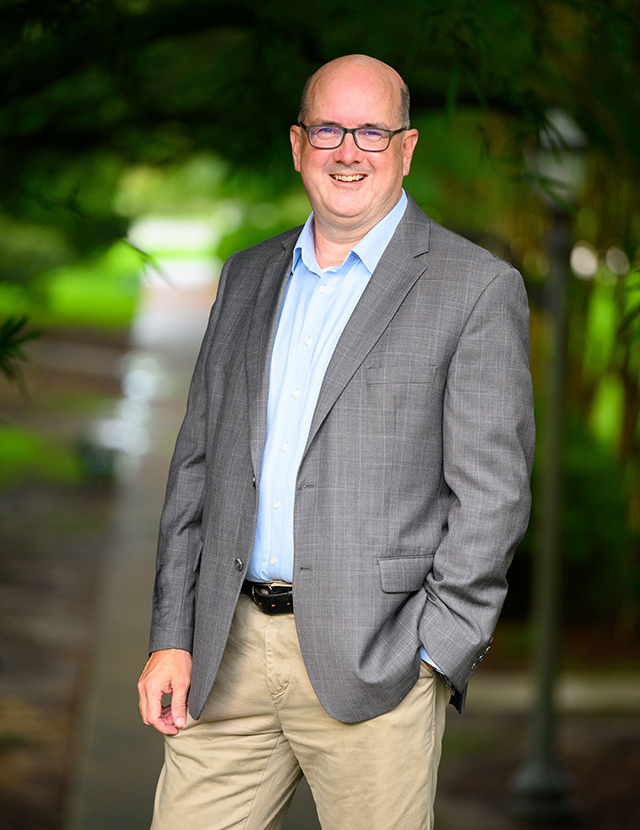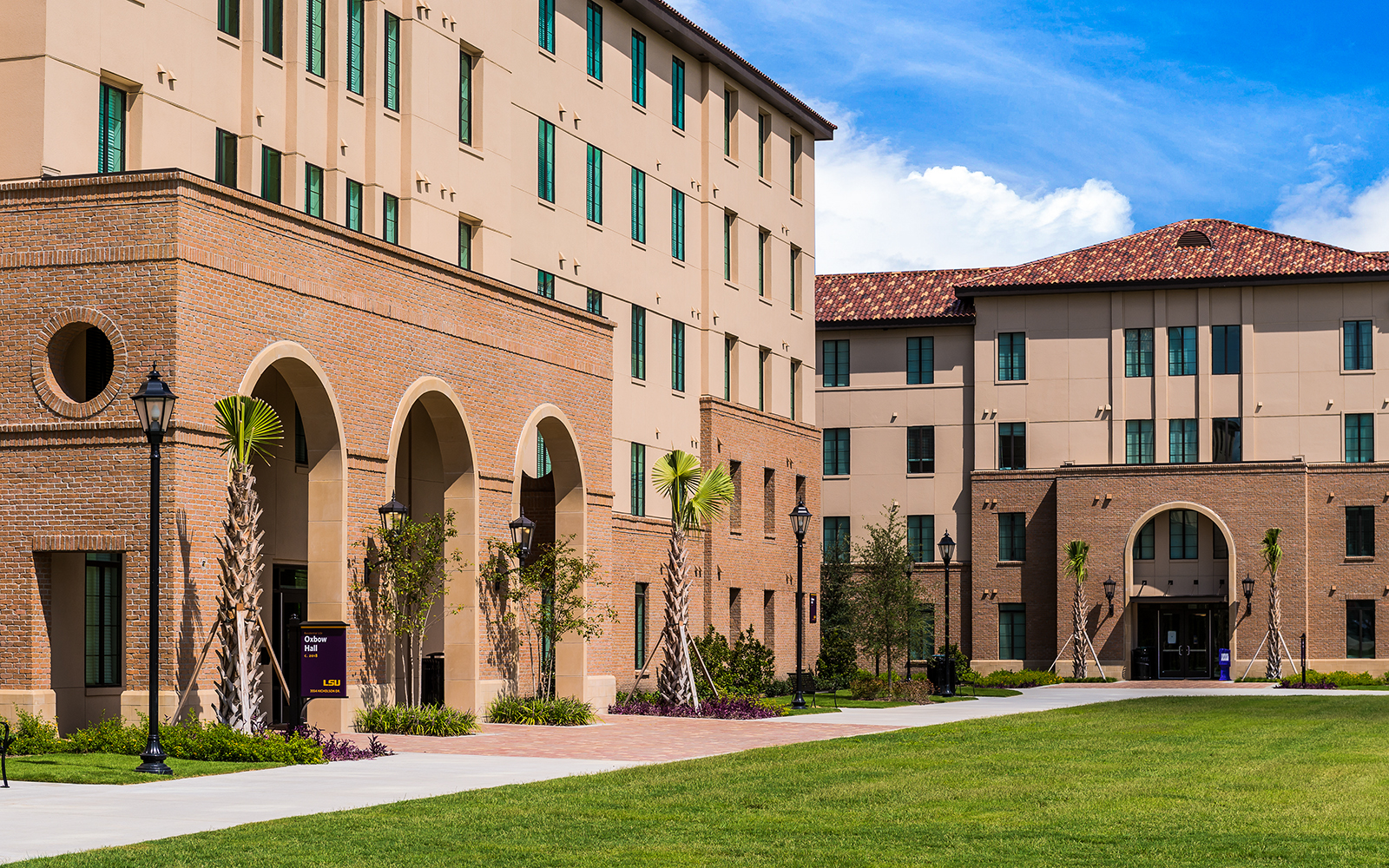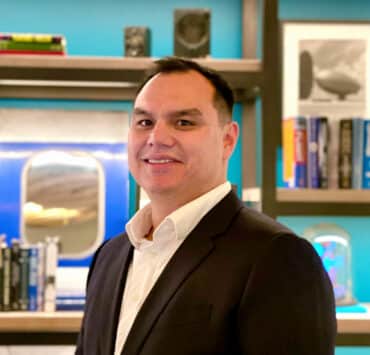|
Getting your Trinity Audio player ready...
|
Patrick Martin has ties to Louisiana State University that run deep. He’s not only worked there for more than 17 years but also completed his undergraduate studies and law degree at the Baton Rouge institution. In a way, his life began there: in 1967, when he was born, his parents were living in married student apartments and brought him home to the campus.
Martin demolished those apartments many years later in his official capacity as the university’s assistant vice president for real estate. It’s just one of many large projects Martin has handled over his long tenure with the eight-campus university system. LSU’s main campus alone boasts more than 30,000 students.
Today, as vice president for real estate, public partnership, and compliance, Martin manages real estate contracts and oversees development projects with budgets topping $200 million. But the veteran facilities and real estate leader didn’t go straight from Louisiana State’s lecture halls to its administrative offices—he spent the first two decades of his career prosecuting corrupt politicians, rooting out fraud, reviewing government spending, and representing and advising former Louisiana Governor Mike Foster.

In that period, Martin not only learned about policy and governance but also touched everything from major economic development projects to school vouchers to criminal pardons. Those varied experiences help him at LSU, where he’s charged with finding creative ways to build partnerships and push innovative projects forward.
“I create precedents of things that have not really been done before in the university setting,” he says, adding that he knows how to play within the rules while navigating bureaucratic red tape. Martin isn’t inventing shortcuts or trying to short-circuit fair play and competition—his role is to maintain integrity, increase efficiency, and get the best results for donors, administrators, and students.
In recent years, Martin has been instrumental in creating P3s, the public-private partnerships that are enabling some of LSU’s most important projects. His team first deployed this innovative development model on a large scale with the Nicholson Gateway Development Project.
Louisiana State University, the LSU Property Foundation, RISE: A Real Estate Company, and Provident Resources Group will work together to design, build, finance, operate, and maintain new student housing, retail space, a recreation center, and other amenities.

To understand why the P3 model works, one must understand what first sparked the redevelopment project. The 28-acre tract of land is an iconic section of campus where LSU’s baseball team won five national championships in 10 years. But the baseball stadium was relocated and the old field demolished. Martin had the chance to treat it as an open greenfield site.
Planners created a master plan and interviewed stakeholders about community needs. A mix of housing and retail emerged as the answer, but Martin knew that traditional funding through tax bonds would never work. He needed to find a new way to fund and develop the project.
Public-private partnerships bring benefits to all parties. For LSU, part of the benefit comes in transferring risk. RISE designed, built, and delivered Nicholson. The real estate company was also on the hook for any liquidated damages associated with delays. Development cost about $215 million but was completed without the use of taxpayer dollars or appropriations from the state general fund.

“These P3 partnerships bring the best results and allow us to do things we couldn’t otherwise do,” Martin says. He has a 40-year lease in place for Nicholson, though LSU leases the facilities from Provident. The deal will generate about $218 million in housing-related fees.
The benefits associated with the P3 model are numerous. It’s faster, it’s cheaper, and it increases Martin’s ability to complete deferred maintenance. It also helps LSU meet growing demand for on-campus housing, which is shown to increase graduate and retention rates.
Success with Nicholson led to another P3 project designed to modernize utility systems at the flagship campus and bring $90 million in savings over three decades. The deal arose as two central plants that heat and cool buildings neared the end of their life cycles.

“We rely on funding from the state and donors for high-profile projects, but who wants to give us money for something as exciting as a boiler?” Martin asks. The answer? No one. Since procuring the parts on an emergency basis would be expensive—Martin knows; he’s done it before—he set out to be proactive.
Louisiana State University’s Board of Supervisors contracted with Bernhard and CenTrio. Bernhard will work with Johnson Controls in a joint venture known as Tiger Energy Partners to build new power, steam, and chilled water plants. CenTrio will then operate the facilities for the next 30 years. Martin points out that this time frame is shorter than comparable deals at other universities, which often span four to six decades.
The LSU Property Foundation, created during the Nicholson Gateway Development Project, brings advantages in state laws and will be the vehicle for the university’s future P3 projects. Its members include those experienced in construction, high finance, law, state government, and commercial real estate.

Martin himself is a member of several boards, through which he gives back to local communities. They include local and state chapters of BASIS charter schools and AMIkids, an organization that serves troubled teenagers and at-risk youth. Martin is also running to unseat a 10-year incumbent in East Baton Rouge School System’s District 9.
These efforts all have one common thread—improving the educational experience for students. As LSU moves forward, Martin plans to do that by fully institutionalizing P3 practices and continuing to lead into the future.
Sevenson Environmental is a national leader in remedial construction and environmental dredging. The company has been actively involved in site remediation and ecological restoration since 1979 when we were selected as the principal contractor at the Love Canal site in Niagara Falls, New York. For more than 40 years Sevenson has successfully worked with federal, state, and local government, and with private clients to address challenging sediment design and construction issues for ecological restoration projects.

